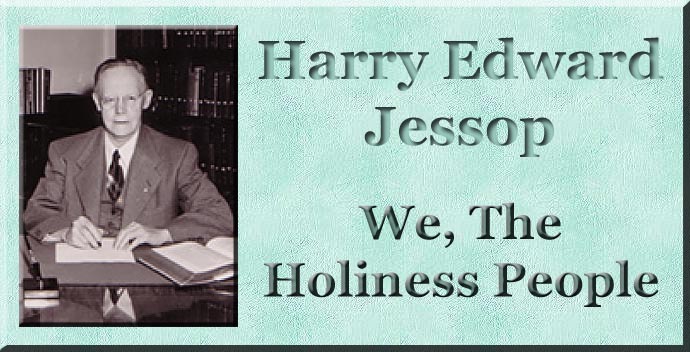
We, The Holiness People
By Harry E. Jessop
Part Two
What do the Holiness People Believe and Teach
Chapter 5
WHAT WE BELIEVE AND TEACH ABOUT THE BIBLE AS THE WORD OF GOD"... The holy scriptures, which are able to make thee wise unto salvation through faith which is in Christ Jesus. All scripture is given by inspiration of God, and is profitable for doctrine, for reproof, for correction, for instruction in righteousness: that the man of God may be perfect, throughly furnished unto all good works." II Tim. 3:15-17. We, the Holiness People, believe the Bible to be Divinely inspired. To us, it is the undisputed Word of God, carrying its own evidences of inspiration. We regard it as more than a book. It is a Sacred Library, having thirty-nine books in the Old Testament and twenty-seven in the New -- sixty-six books in all completing the one amazing volume, the Holy Scriptures. These have come to us through the pens of approximately forty different writers and cover a period of about sixteen hundred years. Measured by social position, these writers are wide apart ranging from the palace on the one hand to the plow handle on the other, and from the priestly office to the fisherman's hut. In temperament and culture they are very different, yet withal, every book bears unmistakable evidence of the same governing mind. That mind we believe to be the Spirit of God. Nor is the Book lacking in its credentials. Both within and without there are proofs of its heavenly origin. When allowed to speak for itself, the appeal it makes to the conscience is amazingly convincing. Its miracles and fulfilled prophecies, its harmony the one part with the other, its prophetic portraiture of Christ and detailed fulfillment, its drastic exposure of sin and great plan of redemption. All go to prove that the hand that made it is Divine. The characters of the men it has produced, no less than the characters of those who produced it argue for its reliability. We recognize, of course, that the Book as we now have it, has of necessity come to us through the hands of many copyists and translators. In this process of centuries, allowance is made for the human element involving the possibility of minor defects in the work of copying and translation, although, even here consecrated scholarship has assured us of a reasonable reproduction of the original. We, the Holiness People, insist however, that as given in the original manuscripts -- both the Old and New Testaments in all their parts -- we have the full and final revelation of God to man which is inerrant and complete. This is accepted by us as the Divinely given authority to govern both faith and practice. Wesley's statement concerning the Bible will crystallize our position. "I beg leave to give a short, clear and strong argument for the inspiration of the Holy Scriptures. The Bible must be the invention of good men or angels, bad men or devils, or of God. a. It could not be the invention of good men or angels for they would not write a book and tell lies all the time of writing, saying, Thus saith the Lord when it was their own invention. b. It could not be the invention of bad men or devils -- for they could not make a book which commands all duty, forbids all sin, and condemns their souls to hell for all eternity. c. I therefore draw the conclusion that the Bible must be of Divine inspiration. Having affirmed our belief in its Divine inspiration we must not leave this statement without a brief word about its interpretation. We acknowledge no single infallible human interpreter, but believe that any normal individual with humble mind and obedient will may approach this Book and find therein that saving truth which is essential to his present and eternal salvation. This faith is based on the promised continuous ministry of the Holy Spirit to illuminate the Scriptures which He has already inspired. When each is rightly interpreted we see no contradiction between God's revelation in nature and that given us in His written Word. Hence there are no conflicts between true science and the Bible. Any seeming contradictions we believe arise out of erroneous interpretations, either by scientists or theologians, or by both. |
|
 |
 |
|
|
|
-
Site Navigation
 Home
Home What's New
What's New Bible
Bible Photos
Photos Hiking
Hiking E-Books
E-Books Genealogy
Genealogy Profile
Free Plug-ins You May Need
Profile
Free Plug-ins You May Need
 Get Java
Get Java.png) Get Flash
Get Flash Get 7-Zip
Get 7-Zip Get Acrobat Reader
Get Acrobat Reader Get TheWORD
Get TheWORD